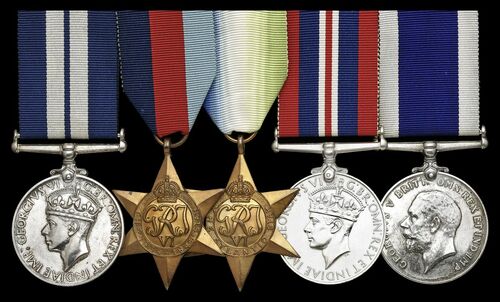
Auction: 23003 - Orders, Decorations and Medals
Lot: 237
A Second World War D.S.M. group of five to Petty Officer H. L. Harris, Royal Navy, who was killed in action aboard H.M.S. Itchen which was torpedoed by a U-Boat whilst escorting a convoy south of Iceland
Distinguished Service Medal, G.VI.R. (J.106084 R. L. Harris. A,B.); 1939-1945 Star; Atlantic Star; War Medal 1939-45; Royal Naval, L.S. & G.C., G.V.R. coinage head (J.106084 H. L. Harris. A.B. H.M.S. Leander.), good very fine (5)
D.S.M. London Gazette 11 June 1942.
Harold Lucas Harris was born in 1900 and joined the Royal Navy on 6 November 1918. His son stated that his father won the Distinguished Service Medal for entering a darkened and damaged engine room on Tamar which was a 'Tribal' class destroyer, after a German air attack off the coast of Norway whilst heading north with a German convoy.
Itchen was a Royal Navy Frigate built in 1941 by Fleming & Ferguson. Under the command of Commander C. E. Bridgman D.S.O., R.N.R., she was escorting an Atlantic westbound convoy in company with the corvettes Polyanthus and Morden and the Canadian destroyer St. Croix. On 23 September 1943, when South of Iceland Itchen was torpedoed during an attack by German submarines and sank with the loss of 14 officers, including Commander Bridgman, and 134 ratings, together with five officers and 75 ratings of the St. Croix which had been sunk previously.
Harris was the son of Francis and Henrietta Harris and husband of Ivy May Harris of South Harrow, Middlesex, and is commemorated on the Plymouth War Memorial.
DOENITZ CHANGES STRATEGY
On 19 September 1943, Admiral Doenitz, with startling suddenness, staged his expected comeback in mid-Atlantic with new tactics and new weapons. He chose a moment, perhaps fortuitously, when two outward-bound convoys were within ninety miles of each other at the extreme range of V.L.R. aircraft. In the late afternoon, Liberators from Iceland observd large packs of U-boats concentrating on both convoys, and immediately called a Support Group to the scene. Just before dawn on 20th September the stern of the frigate Lagan was blown off by a torpedo (she did not sink and was towed safely home). A few hours later two merchant ships were sunk. The sea was calm and their crews were saved by the rescue ship Rathlin. At about noon the senior officer of the escorts, Commander M. J. Evans, R.N., decided it would be prudent to bring the two convoys together and combine their escorts. This rather complicated manoeuvre was effected before dark, with the result that sixty-six merchant ships came under the protection of seventeen warships. During the night the Support Group was constantly in action. All attacks on the convoy were detected and beaten off, but two more escort vessels, the Canadian destroyer St.Croix and the British corvette Polyanthus, were sunk.
Next morning fog came down, persisting throughout the day. Some of the ships in convoy lost touch with one another, but in spite of the difficult conditions, a Swordfish aircraft of the Fleet Air Arm flew off in a clear patch from the M.A.C. ship Macalpine, and by a miracle was able to 'land on' in dense fog. At least fifteen U-boats continued to track the convoy, and during the night when the fog had dispersed, tried to pierce the escort screen. Evans, in the destroyer Keppel, sank one of ramming, while two others were put out of action by depth charges and gunfire. No merchant ships were sunk.
At dawn on 22nd September, fog came down again, but did not prevent the escorts continuing their Asdic hunt astern of the convoy. In the afternoon the weather cleared, disclosing the scattered merchant ships vulnerably disposed over a wide area. At the same time Canadian Liberators from Newfoundland appeared over the convoy and these, together with the Swordfish from the Macalpine and the naval escorts, joined in a combined attack on the U-boats. The battle went on all through the night and the following day. Three U-boats were sunk and many damaged. In the circumstances it was not possible to prevent some of their attacks from getting home, and in the course of a hundred hors' fighting six merchant ships were sunk. At midnight the frigate Itchen sighted a U-boat ahead on the surface. The ship switched on her searchlights and opened fire. Almost immediately she was torpedoed and blew up. By tragic coincidence the Itchen carried on board the survivors from the St.Croix and Polyanthus, and only three men were rescued from the three ships' companies. On the 25th September two fresh escort groups took over the convoy, which reached its destination without interference.
The topedoing of four escort vessels on one voyage was significant, for it indicated that the enemy was shifting his target from the merchant ships to the warships. Hitherto Doentiz had left the escort vessels severely alone; now it seemed he was singling them out for attack.
Subject to 20% VAT on Buyer’s Premium. For more information please view Terms and Conditions for Buyers.
Sold for
£1,300
Starting price
£800




